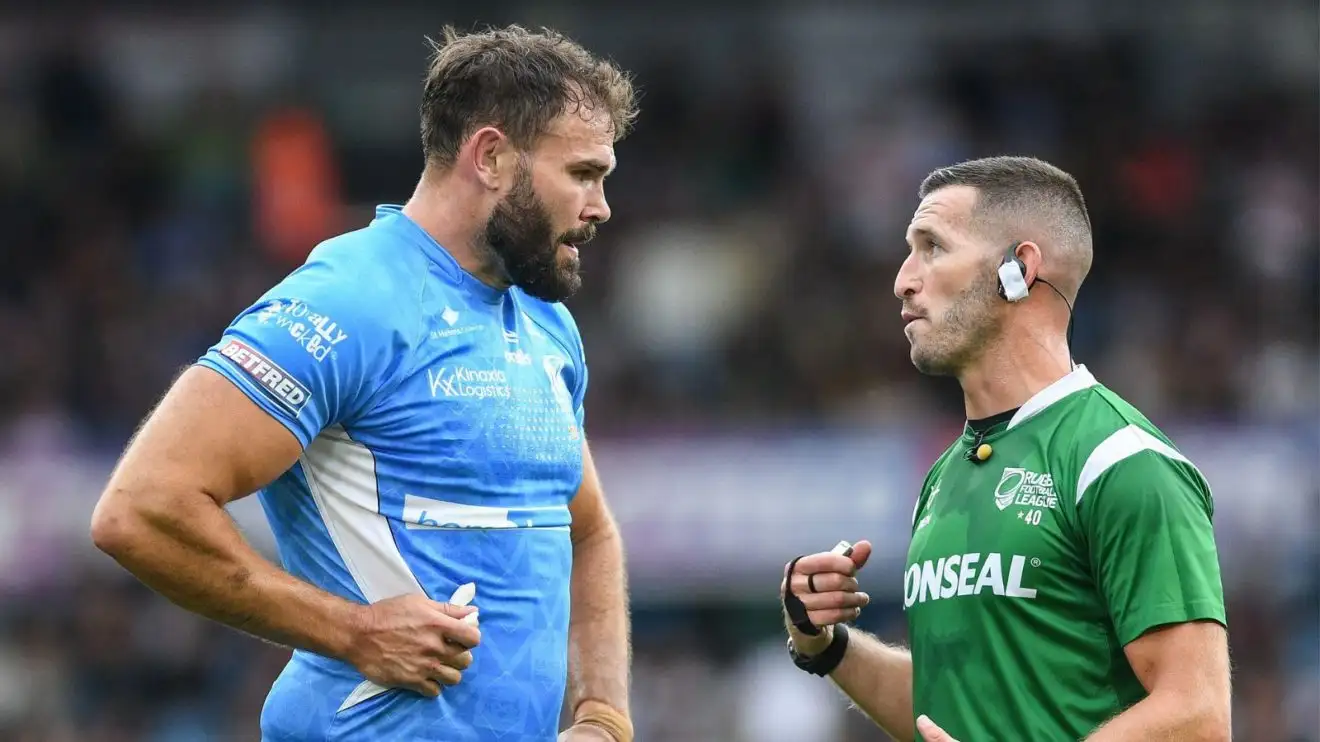RFL make captain’s challenge decision as major Super League rule changes confirmed

Super League referee Jack Smith (right) talks to St Helens' Alex Walmsley (left) during a Super League game in 2024
The RFL have confirmed four major law changes ahead of the 2025 campaign, including the introduction of a Captain’s Challenge in Super League games.
As has been the case in the Southern Hemisphere for a number of years, the captain of each club will be able to challenge on-field decisions in each televised game, with the decision in question referred up to the video referee.
Akin to the NRL though, teams will only be allowed one unsuccessful challenge. If the decision they contest is overturned, they’ll retain the ability to challenge another.
But if the decision they contest remains the same following the video referee review, then they’ll lose their Captain’s Challenge for that game, regardless of how long remains in the contest.
This will apply to every men’s Super League game as well as televised fixtures in the men’s Challenge Cup, Women’s Super League and Women’s Challenge Cup.
LRL RECOMMENDS: Every Super League half-back off-contract in 2025, including Leigh Leopards trio
Captain’s Challenge headlines four major law changes announced by RFL ahead of 2025
There are some restrictions on which decisions can be challenged, and when a Captain’s Challenge can be used, which are as follows:
- Time Limit: a captain has until the referee is ready to recommence play, upon which the challenge time frame will lapse; the referee will not unduly delay the restart of play; there will be 10 seconds from the referee communicating the decision (by signal and verbally).
- The challenge is only permissible in instances where the referee blows the whistle to stop play (except for stoppages for injury or suspected injury)
- Decisions that cannot be challenged are: Forward Pass; Roll Ball; Discretionary penalties (10m/marker oHside, ruck infringements relating to the speed of the play the ball, tackled into touch or in-goal after the held call); the mark of a penalty; time wasting; dissent; deliberate forward pass; scrum penalties.
Three other law changes were passed by the RFL Board at their meeting on Tuesday following recommendations from the RFL’s Laws Committee…
Contested Dropouts
If a team kicks a drop out on the full over the touchline or kicks a drop out so that it fails to travel at least 10 metres forward in the field of play, play will restart with a play the ball 10 metres out from the centre of the goal line rather than a penalty kick from the centre of the 10 metre line.
If a team takes a 20 metre drop out and it travels on the full over the touchline or kicks a 20m drop out so that it fails to travel at least 10 metres forward in the field of play, play will restart with a play the ball from the centre of the 20 metre line, rather than a penalty kick from the centre of the 20 metre line.
Offside Kick Chasers
Referees and video referees will now differentiate between active and passive players when awarding penalties for offside.
An active player will be defined as one who takes part in and/or influences the course of the game.
A passive player will be defined as one who does not influence the course of the game.
Green Card
Now applies to attacking players as well as and defending players.
Should the referee call time off either themselves or at the request of either a Physio, Doctor or Head Trainer to allow a player to receive attention, then the protocols set out in the Timekeeping protocols will be followed and the player will either leave the field for a concussion assessment, be interchanged, leave the field of play and return immediately once an interchange card is handed over or leave the field for 2 minutes of elapsed playing time before being allowed to re- enter the field.
Should the referee call time off either themselves or at the request of either a Physio, Doctor or Head Trainer for an injury that results from a penalty for foul play, the injured player will not be subject to the green card policy as outlined.
LRL RECOMMENDS: Papua New Guinea NRL franchise confirmed with expected entry date revealed
Head Contact
In addition to the law changes above, the RFL Board have also approved a significant amendment to the recommendations relating to head contact that were introduced last winter.
As a result, the regulations around head contact from Tiers 1-3 – Men’s and Women’s Super League, Championship and League 1 – will remain as they were in 2024.
This follows a significant reduction in concussive and sub-concussive events in Super League in 2024, measured by the widespread use of instrumented mouthguards.
Essentially, that means that tackles below shoulder height will still be permitted rather than below armpit height, as it was meant to change to in 2025.
LRL RECOMMENDS: Hull KR top and Hull FC bottom in Super League table based on half-time scores